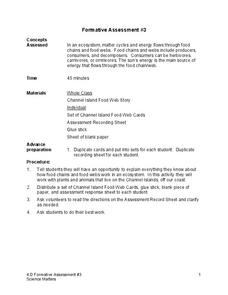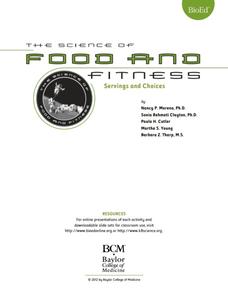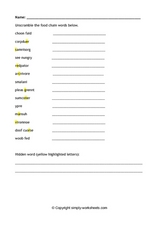College Board
2018 AP® Environmental Science Free-Response Questions
Less than nine percent of all AP Environmental Science test takers scored a perfect five on the exam in 2018. Learn from the best answers as well as the common mistakes thanks to the College Board. Four questions from the test covering...
Simply Worksheets
Food Chain Categories
For this food chains worksheet, students fill out the food chains listed with the correct consumer and producers. Students fill out 4 food chains total.
NOAA
An Ocean of Energy
Young biologists trace the path of the sun's energy through marine ecosystems in the second part of this four-lesson series. Building on prior knowledge about producers, consumers, and decomposers students are introduced to the concept...
Ask a Biologist
It’s a Plankton Eat Plankton World
For as small as they are, plankton sure play an enormous role in maintaining marine ecosystems. Dive into an investigation of these tiny organisms with a hands-on life science activity in which children cut out pictures of sea animals...
Ventura County Air Pollution Control District
Effects of Global Warming
Your learners have probably heard of climate change, but do they really understand what it is? Study the history, details, and future implications of global warming and the greenhouse effect with a set of activities designed for an...
College Board
2007 AP® Environmental Science Free-Response Questions
Mother Nature may have less control of temperature than you think! Young scholars consider the effect urban environments have on local and surrounding temperatures as they respond to one of four free-response assessment questions from...
Science Matters
Energy Flow
Budding scientists work collaboratively to reenact energy flow in a food chain. Scholars take on roles such as producer and consumer and perform tasks that symbolize energy flow in order to provide evidence of how much energy passes...
NOAA
Understanding Food Chains and Food Webs
Jump into an exploration of marine ecosystems with the first lesson in this four-part series. After first learning about crustaceans, mollusks, and other forms of sea life, young marine biologists view a PowerPoint presentation that...
K12 Reader
What’s Eating You?
Introduce your class to producers, consumers, and pollinators with a reading passage. Class members read the text and respond to five related questions.
National Park Service
Living & Non-Living Interactions
What better way to learn about ecosystems than by getting outside and observing them first hand? Accompanying a field trip to a local park or outdoor space, this series of collaborative activities engages children in learning about the...
EduGAINs
Go H2O! Investigating Residential Water Systems
Before your learners excuse themselves to get a drink at the water fountain, prompt them to think about where that water comes from. A middle school science instructional activity encourages groups to research their community's source of...
Science & Plants for Schools
Photosynthesis - A Survival Guide
Young scientists learn what it takes for life on Earth to survive with this series of photosynthesis resources. Offering twelve different activities ranging from independent practice worksheets to in depth scientific experiments, this...
Kentucky School for the Deaf
Levels of Organization within an Ecosystem
From tiny organisms to entire biomes, young scientists examine the interdependent relationships tying all living and non-living things together with this collection of ecology resources.
King County
Reproductive System
It's every health and science teacher's favorite subject to cover: the reproductive system. This comprehensive lesson introduces adolescents to the reproductive anatomy of men and women with the help of a series of diagrams, discussions,...
Baylor College
Do Plants Need Light?
Turn your classroom into a greenhouse with a lesson on plant growth. First, investigate the different parts of seeds, identifying the seed coat, cotyledon, and embryo. Then plant the seeds and watch them grow! Measure the new plants...
EduGAINs
Go Eco! Ecosystems
How is a movie theater like a desert biome? Compare systems to ecosystems with a set of activities that focuses on accessing multiple intelligences and building upon knowledge. As learners discuss the ways elements of an ecosystem depend...
Beyond Benign
Water Bottle Unit
How much plastic do manufacturers use to create water bottles each year? The class explores the number of water bottles used throughout the years to determine how many consumers will use in the future. Class members compare different...
Science Matters
Crawly Composters
Get your hands dirty with an interactive instructional activity that showcases the process of decomposing and returning nutrients back into the soil. After building a compost pile, pupils regularly observe the...
Science Matters
Formative Assessment #3
Thirteen short-answer questions follow a brief food web activity in a formative assessment designed to test knowledge of ecosystems and the energy that flows through them.
Baylor College
Servings and Choices
An important part of balancing caloric intake to energy expenditure is knowing how many Calories you are consuming. In the fifth of a seven-activity series on food and energy, learners estimate their daily caloric intake, then use a...
Curated OER
Fuel Cell Experimentation
With rising oil prices and increasing concerns over global warming, the pressure is on for engineers to develop alternative sources of energy. Among the new technologies being developed are hydrogen fuel cells, which young scientists...
Simply Worksheets
Food Chain Word Scramble
In this food chain words learning exercise, students unscramble the food chain words and then find a hidden word. Students unscramble 14 words total.
Texas State Energy Conservation Office
Cost-Effective Buying
Middle school energy experts read about the relationship between energy use and cost-efficiency. Then they work through a couple of scenarios to determine which approach is more cost-effective.
NASA
Biology Training Conclusion
Gravity is just one consideration when determining human habitability on a new planet. The lesson plan connects four different units and starts with connecting the various systems: planetary systems, human body systems, etc. After...
Other popular searches
- Family and Consumer Sciences
- Family Consumer Science
- Consumer Science Foods
- Consumer Science Manners
- Health and Consumer Science
- Consumer Science Fibers
- Consumer Science Fibres
- Fm & Consumer Science
- Family & Consumer Sciences
- Consumer Science Fib Res
- Consumer Science Careers
- Food and Consumer Sciences

























